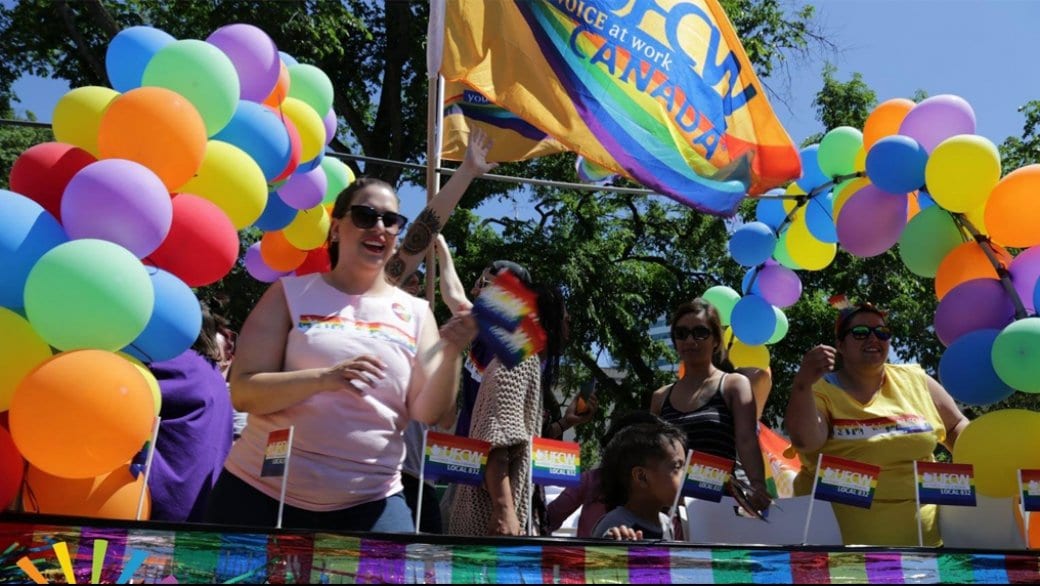Pride Winnipeg says police are welcome to march in the parade on June 4, 2017, but not in uniform.
According to a Pride Winnipeg statement released May 26, officers will be allowed to participate “in the spirit of cooperation and inclusion,” but will have to leave their uniforms and their police cars at work. Officers will, however, be allowed to wear police department T-shirts and carry a banner.
The decision follows six days of now-closed surveys on SurveyMonkey and months of community consultation.
Pride Winnipeg vice-president Darrel Nadeau says the consultations began after Pride season last year. The organization hosted a town hall in July 2016 to ask what Pride had done well and what needed to improve. It was well attended, he says, but lacked diversity.
“We asked, ‘Why won’t people from diverse backgrounds come give us feedback?’” he says, explaining that Black Lives Matter’s protest at the 2016 Toronto Pride parade woke up Winnipeg’s volunteer-run Pride board and inspired self-reflection on the lack of diversity on their own planning team.
“We spent the past year working really hard — listening and consulting with community groups and enhancing the voice of those who have been traditionally excluded,” he says.
Nadeau says listening to community members led Pride Winnipeg to rethink who is currently sharing in the celebration and what marginalization still occurs, and what advocacy work remains. It also inspired this year’s Pride theme: Resurgence: Taking Back Space, and led to the recent online survey.
According to the survey’s results, members of some marginalized groups in the LGBT community, such as non-binary, two-spirit, indigenous and trans people, had less positive experiences with police than respondents who identified as gay. Nearly one third of respondents said they wanted police to either be invisible in the parade or removed altogether, while another third said they would accept uniformed police but only if the department made a firm commitment to improve its relationship with the community. More than 600 people filled out the survey.
Based on the results, Nadeau says Pride decided to invite rather than exclude police, but with conditions.
“To improve the relationship between police and the LGBTTQ community, our focus is to have dialogue with the police,” he explains. “Not to exclude them from conversations, which some people have asked us to do. We are taking a stance that complete exclusion is not going to bring positive change.”
Winnipeg police Inspector Gord Friesen says it was police who first reached out to Pride Winnipeg after Black Lives Matter held its sit-in at Toronto Pride last summer.
Nadeau agrees. “Pride Winnipeg was undergoing community consultations on this issue and had not yet contacted police when they touched base with us. It’s been a very collaborative and positive process,” he says.
Friesen says the dialogue has been unfolding since.
“We’ve been in conversation the last 10 months after Toronto,” he says. “I was really impressed they took the step of reaching out within the community to do the survey.”
Friesen believes the Winnipeg police force has “a pretty good relationship with the community, but you can always do better.”
He says he and some officers are disappointed they can’t march in uniform this year, but they feel Pride Winnipeg has the right to choose.
“It’s their event, we are their guests,” he says.
He says officers can feel uncomfortable without their uniform because they take an oath to act when they see trouble, and the equipment on their belts can be useful in case of an incident. “But the people at Pride did a really good job explaining why and it was the stress response for some people on seeing uniforms and firearms,” Friesen says.
“I can draw a parallel with that: we have a diversity relations unit within our division and we go out and speak to newcomer groups,” he says. “People sometimes come from countries where the police aren’t the same as here — they can be corrupt, they can be oppressive, they’re not your friends, and so when the police come to your house that’s not a good day.
“When they come to Canada with that context it’s not as if you can just turn that off and say it’s different here, the police are not corrupt, they’re here to help and support,” Friesen continues. “Seeing a uniform or a firearm, those people don’t have the ability to control how their bodies will respond.”
Friesen says officers often wear plain clothes when meeting more vulnerable people, and says the Pride decision seems to be founded on a similar principle.
In February, Halifax police announced their intention to voluntarily withdraw from this year’s Pride parade and the Toronto police force soon followed suit to say it will respect Pride Toronto’s decision to ban uniformed police from the parade.
On May 18, the Vancouver Pride Society announced that it will allow some uniformed police to march as part of a civic services entry this year.
Pride Winnipeg runs from May 26 to June 4, 2017.

 Why you can trust Xtra
Why you can trust Xtra


